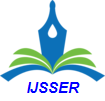Abstract:
This paper focused on assessing the impact of GDP rebasing on the Nigerian economy. It
examined the Nigerian economy in the light of the post-rebased period as well as the pre-rebased
period. The emerging revelations from the GDP rebasing exercise showed that the Nigerian
economy appeared to be driven by the services sector, followed by industrial and agricultural
sectors respectively. Comparatively, the old GDP of 2013, showed the industrial sector as having
the highest contribution, followed by agricultural and services sectors respectively. The rebased
real GDP revealed an increased growth rate of 7.41 percent in 2013. The paper also found that
the rebased GDP results released by the National Bureau of Statistics, revealed Nigerian to be
the largest economy in Africa and the 26th largest in the world, but with a low per capita income
as at 2014, which placed Nigeria among the lower middle income economies. It is observed from
the study that few years after the exercise the Nigerian economy is bedeviled by economic
recession occasioned by low GDP growth, high inflation, high unemployment, low capacity
utilization and poverty. In conclusion, the paper recommended among others, that the
government should diversify the economy to manufacturing production in order to increase the
productive capacity of the economy while exploiting the new opportunity provided by the
service sector. Also, in order to take advantage of the new size of the economy, the government
should provide the necessary macroeconomic environment in order to increase Foreign Direct
Investment in Nigeria. |
 International Journal of Social Science & Economic Research
International Journal of Social Science & Economic Research

